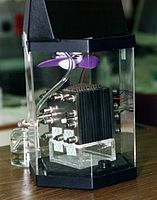
Photo from wikipedia
Abstract Waste heat elimination via integration techniques has been recognized as an effective solution for the performance enhancement of renewable energy-based power plants. In this paper, a new plant, based… Click to show full abstract
Abstract Waste heat elimination via integration techniques has been recognized as an effective solution for the performance enhancement of renewable energy-based power plants. In this paper, a new plant, based on an external reformer molten carbonate fuel cell, is proposed and analyzed. The system consuming the biogas fuel produced by a digester plant. A gas turbine and a supercritical CO2 cycle are used as bottoming cycles of the proposed layout and its superiorities over the previously developed models are reviewed in terms of thermodynamics, thermoeconomics, and environment. Moreover, a sensitivity analysis is carried out to assess the effect of crucial design parameters on the main performance indexes namely exergy efficiency, net output power, total cost, and the unit product cost of the system. The results indicate that the maximum exergy destruction rate is associated with the water preheater (HX1), and it is followed by the combustion chamber, main heat exchanger, and burner. Further, three-objective optimization is carried out employing the non-dominated sorting genetic algorithm II artificial neural network in MATLAB. Results demonstrate a very great potential in the system to have a higher exergy efficiency of 80.28% which corresponds to the cost of 9.82 $/GJ. Considering the cost and CO2 emission, the minimum unit product cost of 9.46 $/GJ and minimum CO2 emission of 354.01 g/MWh can be achievable.
Journal Title: Applied Thermal Engineering
Year Published: 2021
Link to full text (if available)
Share on Social Media: Sign Up to like & get
recommendations!